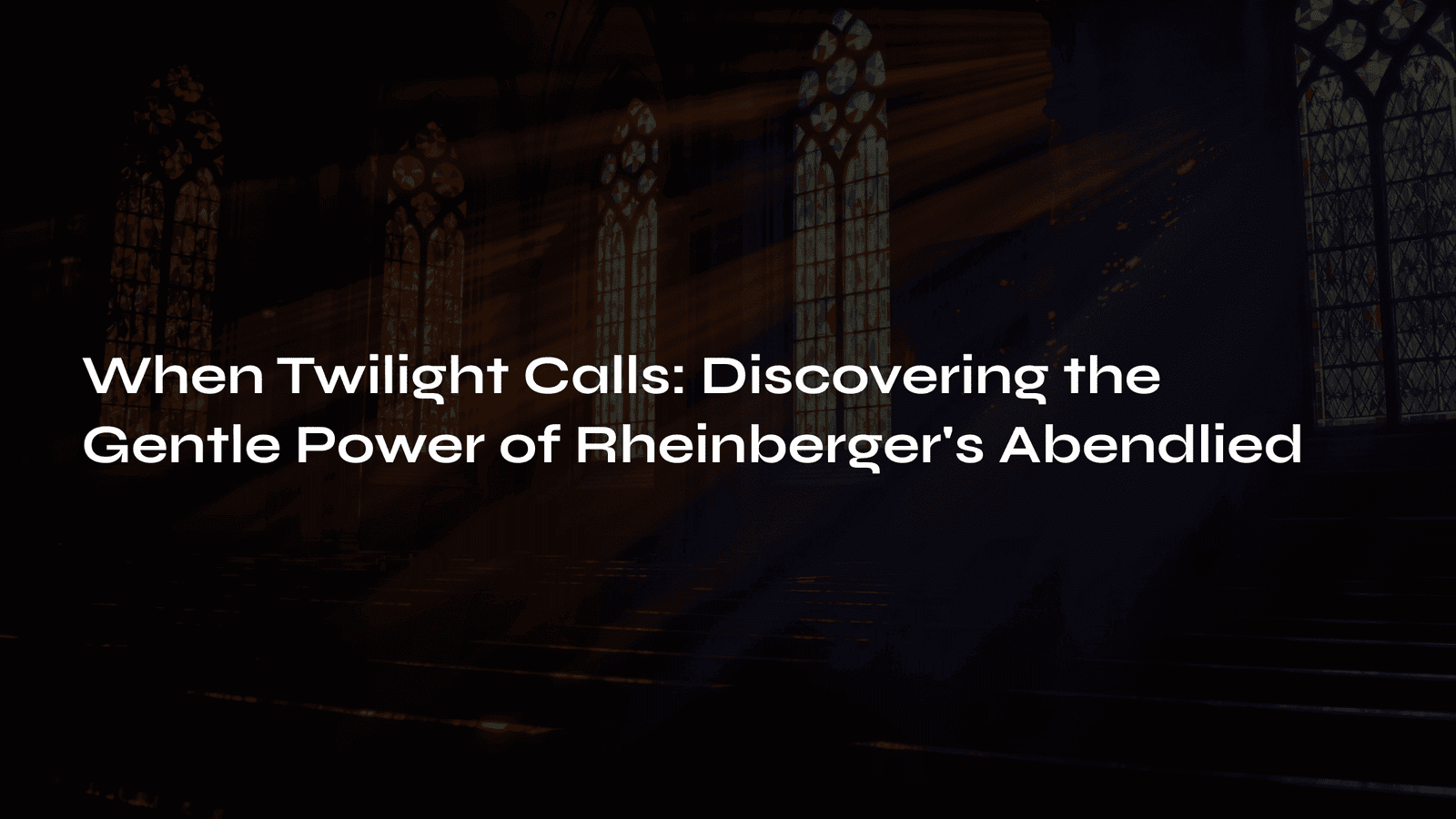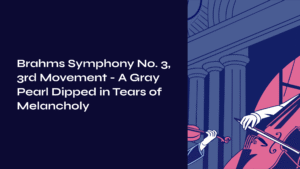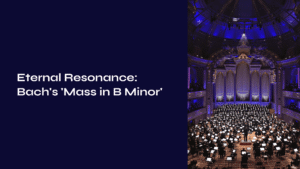Table of Contents
There’s something profoundly moving about music that captures the exact moment when day surrenders to night. In those precious minutes when the world grows quiet and shadows lengthen, we often find ourselves yearning for something beyond ourselves—a presence, a comfort, a gentle voice saying “stay with us.” It’s in this tender space between light and darkness that Josef Gabriel Rheinberger’s “Abendlied” finds its home, whispering an ancient prayer that has resonated through concert halls and churches for over 150 years.

The Prodigy Behind the Prayer
Josef Gabriel Rheinberger was barely fifteen when he penned the first draft of “Abendlied” in 1855. Born in the tiny principality of Liechtenstein, this musical prodigy had been playing piano since age four, but it was his gift for choral composition that would leave the most lasting mark. The fact that a teenager could craft something so spiritually mature speaks to an extraordinary musical intuition that would define his entire career.
The piece we know today actually went through significant revisions before reaching its final form as Op. 69 No. 3 in 1873. Rheinberger, now an established professor at the Munich Royal Conservatory, refined his youthful inspiration with the wisdom of maturity. The result was a work that balanced the emotional directness of youth with the sophisticated craftsmanship of experience.
What makes this story even more remarkable is how the piece adapted to different traditions. Originally composed in German, Rheinberger later created a Latin version titled “Mane Nobiscum” to meet the liturgical requirements of Catholic churches. This bilingual journey allowed the work to transcend denominational boundaries and find a home in diverse sacred traditions.

A Musical Canvas of Evening Light
“Abendlied” opens with something truly magical—three women’s voices (two sopranos and an alto) floating together in F major, like the last golden rays of sunlight. For three gentle beats, they hold this luminous harmony before the men’s voices enter with a subtle shift to A minor on the word “uns” (us). It’s as if the music itself is painting the transition from day to evening, from solitude to community.
The text comes from Luke 24:29, where two disciples encounter the risen Christ on the road to Emmaus: “Stay with us, for evening is coming and the day is nearly over.” But Rheinberger doesn’t treat this as a simple biblical quotation—he transforms it into a universal human plea for presence in times of uncertainty.
Watch how cleverly the composer matches music to meaning. When the text speaks of the day “inclining” or “bending” toward evening, the tenor and bass lines actually descend chromatically, creating a musical sunset. It’s these kinds of word-painting techniques that make the piece feel so natural and inevitable, as if the notes themselves were born from the meaning of the words.
The climax comes when all six voices unite in a powerful “O bleib bei uns” (O stay with us), creating a harmonic intensity that feels like a communal cry of the heart. Yet even in this moment of greatest volume, the music maintains its essential gentleness—this is pleading, not demanding.

Why This Piece Moves Us
There’s something about “Abendlied” that goes straight to the emotional core. Perhaps it’s the way Rheinberger captures that universal human experience of facing the unknown. Evening has always been a metaphor for uncertainty, for endings, for the mysteries that lie beyond our control. When we sing or hear “stay with us,” we’re not just talking about the physical presence of another person—we’re expressing our deepest need for companionship in life’s difficult moments.
The six-part harmony creates an acoustic embrace that mirrors the emotional content. Unlike some choral music that showcases individual voice parts, “Abendlied” is all about unity. The voices weave together like conversations among close friends, supporting and responding to each other. There’s no showing off here—just pure, shared expression.
What strikes me most is how the piece manages to be both intimate and universal. It speaks to personal moments of doubt and fear, yet it’s designed for group performance. This paradox reflects something profound about human nature: our most private struggles are often best understood and comforted through community.

Listening Like a Choir Director
To really appreciate “Abendlied,” try focusing on how the voices interact rather than following just one melody line. Notice how the sopranos often carry the main tune while the lower voices provide harmonic support, but occasionally the roles reverse. Pay attention to the moments when all six parts move together versus when they create counterpoint.
If you’re listening to a recording, seek out versions that emphasize the piece’s gentle dynamics. The best performances begin almost inaudibly and build gradually, like watching the sun set in real time. The Cambridge Singers under John Rutter offer a particularly beautiful interpretation that captures both the music’s English cathedral tradition and its German romantic roots.
For live performances, try to experience the piece in a space with natural acoustics—a church, chapel, or concert hall where the sound can breathe. “Abendlied” reveals different layers depending on where you’re sitting, so don’t be afraid to close your eyes and let the harmonies wash over you.
Consider also listening to both the German and Latin versions. While the Latin “Mane Nobiscum” has a more liturgical feel, the German original carries an intimate, almost folk-like quality that connects directly to the heart.

An Evening Prayer for All Seasons
More than 150 years after its creation, “Abendlied” continues to offer comfort in our age of constant motion and digital noise. There’s something deeply therapeutic about music that asks us simply to be present, to acknowledge our need for connection, and to find peace in shared vulnerability.
Rheinberger’s masterpiece reminds us that the most profound music often comes from the simplest emotions. In our complex world, there’s wisdom in returning to these fundamental human experiences—the falling of evening, the need for companionship, the gentle power of voices joined in common purpose.
As the last notes fade and silence returns, “Abendlied” leaves us with something precious: the memory of a moment when time seemed to slow down, when six voices became one prayer, and when the gathering darkness felt not frightening but full of possibility. In the end, isn’t that exactly what we’re asking for when we whisper “stay with us”—not just presence, but the promise that even in uncertainty, we’re not alone?

If You Loved This, Listen to This Next
If you were moved by Rheinberger’s intimate evening prayer and its gentle plea for divine presence, you’ll find yourself equally captivated by Bach’s Mass in B Minor – Kyrie Eleison – where similar themes of human vulnerability and spiritual longing unfold on a magnificent orchestral and choral canvas that transforms personal supplication into universal artistic triumph.
Both works reveal how composers across different eras channeled humanity’s deepest spiritual yearnings into music that transcends time and speaks directly to the soul.



